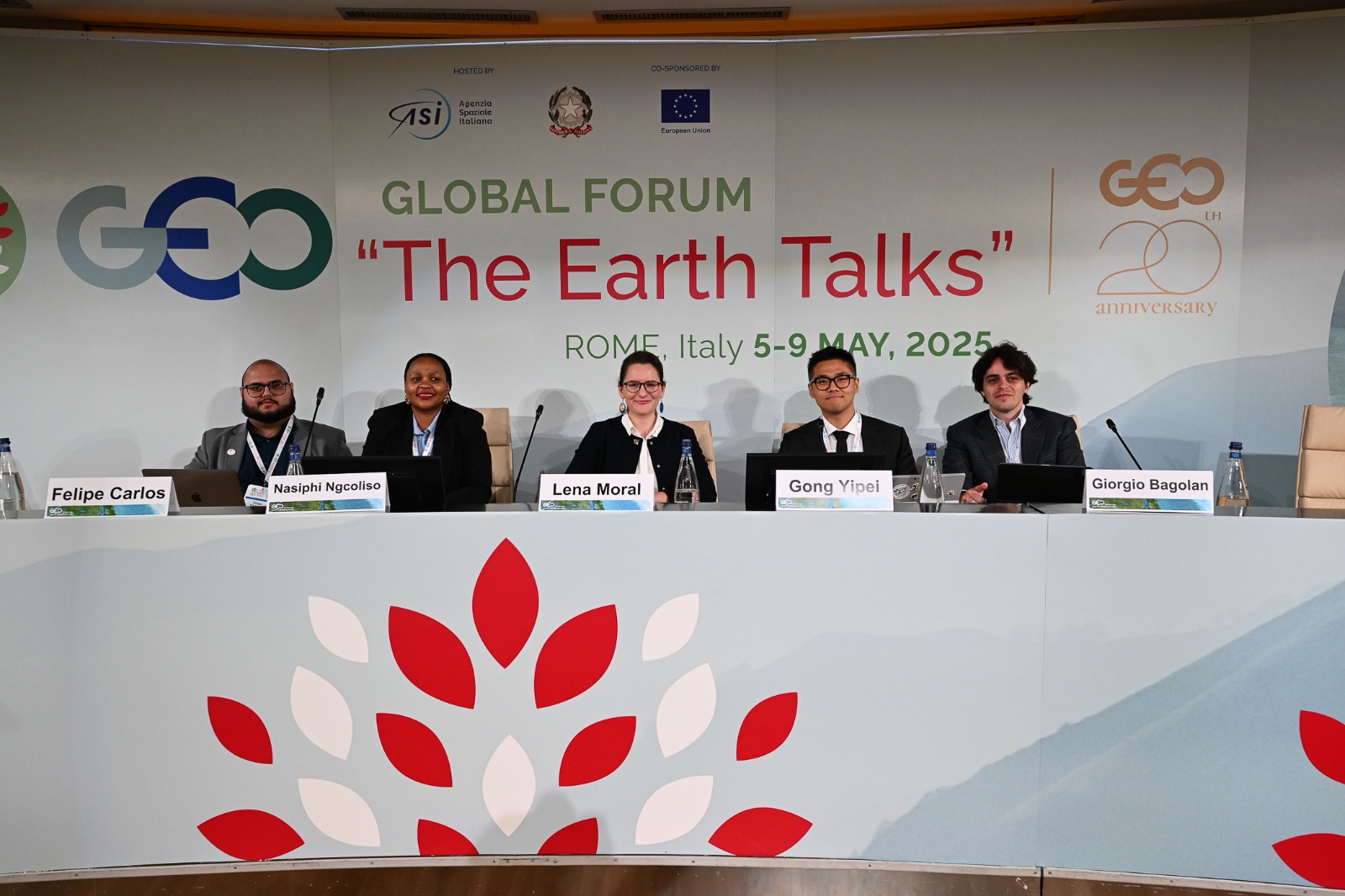Youth are the future of Earth Intelligence for All

Young people will inherit the consequences of the climate and nature crisis. Yet too often, their potential to address these challenges goes unacknowledged and unfulfilled.
As GEO begins implementing the vision of Earth Intelligence for All, youth are both demanding change and driving it. From research and development to entrepreneurship, young people are shaping how Earth Intelligence serves communities and societies.
At the GEO Global Forum plenary, a panel of five youth, moderated by Samuel Amos of the GEO Secretariat, made the case for why engaging young people is critical to achieve Earth Intelligence for All.
In her keynote speech, Dr Musonda Mumba, Secretary-General of the Ramsar Convention on Wetlands, emphasised that youth empowerment is essential to navigate a challenging, complex world.
Here are some key takeaways from the session:
Youth are already implementing positive change
For years, young people have been driving Earth Intelligence and informed decision-making across the GEO community.
Felipe Carlos, a full stack developer for the GEO Knowledge Hub, explained that early-career researchers are contributing to the Brazil Data Cube project so decision-makers can better support families facing natural disasters.
Young scientists in South Africa are developing tools in the AfriCultuReS platform for decision-makers to monitor rangeland health and understand impacts on food prices, said Nasiphi Ngcoliso, a junior remote sensing scientist at the South African National Space Agency (SANSA).
Participation alone is not enough
While youth engagement is gaining momentum, equal access remains a challenge, especially for those from communities most affected by environmental risks.
As Felipe Carlos noted, complex visa processes can be a barrier, preventing qualified applicants from benefiting from many opportunities for growth and networking.
Yipei Gong, a programme officer at the Chinese Academy of Sciences Aerospace Information Research Institution (AIRCAS), shared a similar perspective. Although AIRCAS has trained over 2,000 young professionals in disaster risk reduction, many youth still face financial and logistical hurdles that limit their ability to attend in-person workshops.
These examples highlight the broader need for sustained investment and systemic support to ensure youth participation is both meaningful and accessible for all.
Supporting youth-led and youth-developed Earth observations solutions is also crucial.
Nasiphi Ngcoliso highlighted the lack of mentorship and financial support as major barriers for young entrepreneurs. “One of the biggest challenges we face as young people is the limited access to mentorship and incubator programmes,” she said. “We’re not mentoring young, promising professionals with their innovative ideas and helping them change those ideas into practical solutions.”
Felipe Carlos added, “If you want to empower the young generation to be able to develop their own solutions, we need more. We need to teach them how to code, to not be dependent on a specific tool.”
Youth are an essential part of Earth Intelligence for All
The 2023 GEO Youth Declaration called on GEO to institutionalise youth representation and support and build global youth communities.
Accordingly, youth have a dedicated goal in GEO's Post-2025 Strategy: Increase the participation of young people in the development of Earth Intelligence, or Goal 4.
Created with the GEO Youth Community of Practice and part of GEO’s Post-2025 Strategy Implementation Plan, the approach for Goal 4 addresses these demands using feedback from young people across the GEO community.
The plan is to leverage GEO’s global community to make sure Earth Intelligence and innovation are available to all youth, including Indigenous youth and those from underrepresented regions. Goal 4 will support GEO’s other goals to increase accessibility and deliver innovative Earth Intelligence solutions.
“If we achieve [Goal] 4, that means achieving all the other [goals],” said Lena Moral Waldmeier, a stakeholder engagement specialist at Apacheta.
Yipei Gong also highlighted the potential of regional and local Youth Communities of Practice. “By equipping young scientists with Earth Intelligence skills, they directly contribute back to their communities with local solutions…This is how we build Earth Intelligence for All from the ground up.”
Fulfilling GEO’s promise to youth
The GEO Global Forum was a rallying cry to drive innovation, inform decision-making, and increase global equity with Earth Intelligence.
These ambitious efforts will not succeed without young people. At the GEO Youth Ideathon, 12 young changemakers learned technical and communicative skills before being challenged to create Earth observations-based solutions for Italian small business owners.
“We looked people in the eye and answered their needs. We prototyped, we failed, we adapted,” said Ideathon participant Giorgio Bagolan, a researcher at La Sapenzia University of Rome.
With the implementation of GEO’s Post-2025 Strategy, the GEO community must now come together to realise the potential of young people to make historic contributions to Earth Intelligence for All.
“When we say we’re keeping a promise, we stick to the promise. And when we say we’re offering a seat at the table, it is an element of inclusivity, it is the aspect of humility to listen to some even seemingly unpopular ideas,” said Dr Musonda Mumba.
Samuel Amos closed the session with a reminder:
“By keeping our promises to young people, we don’t just support their future... we shape the future of GEO itself.”